All images courtesy of Phil Allocco/Law and Order
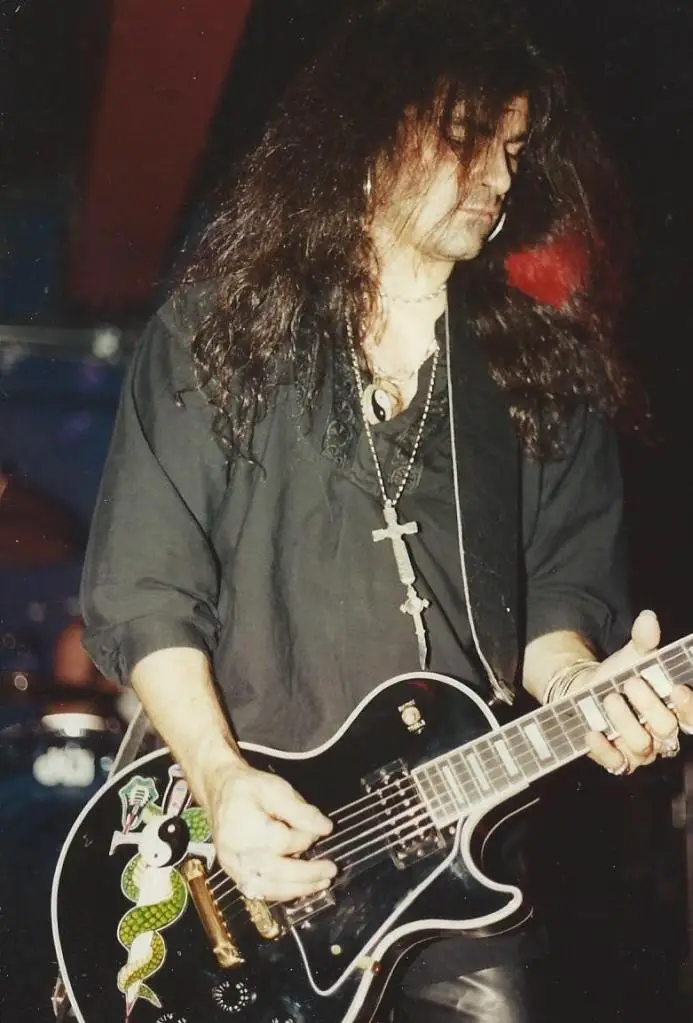
When looking back at the 80s and early 90s rock and metal era, it’s easy to hyperfocus on the LA scene which was bursting with talent, charisma, and machismo.
Look closer at the entirety of the scene, and you’ll find that the east coast, specifically NYC, was a bustling scene in its own right, albeit seedier, and of a different vibe entirely.
Of all the bands which comprised the NYC hard rock and heavy metal scene, Law and Order was one of the most unique, as the four members of the band, Shane (vocals), Sean Carmody (bass), Rob Steele (drums), and underexposed guitar hero, Phil Allocco, refused to conform to any one genre. Instead, the non-partisan rockers chose to straddle as many genres as they could possibly fit under the umbrella of “hard rock.”
Law and Order’s debut, Guilty of Innocence, is an era-defying diamond in the proverbial rough, and if it wasn’t for label indifference, which boiled down to MCA Records’ inexplicable lack of lucidity, Law and Order just might have broken the entire east coast hard rock scene wide open.
As is the case with any great rock band, and make no mistake, Law and Order were great, the band had a frontman who could deal in spades in Shane, but as history dictates, in every great rock band, with a great frontman, lies a great lead guitarist, and Law and Order had that too in Phil Allocco.
While the lowkey Allocco may never have fancied himself a “guitar god,” those who have heard him play know once simple truth — he never had a choice. Those in the “know” are well aware of Allocco’s contributions to the rock scene, and while his work with Law and Order and Dogma may only amount to four records in total, those four records, without a shadow of a doubt, will stand the test of time.
I recently sat down with Phil Allocco for a rare interview, where we cover the entirety of his career.
Andrew:
Phil, thank you for taking the time. As a burgeoning musician, what first gravitated you toward the guitar? Who were some of your early influences which shaped your style early on? How has your style changed as you’ve moved forward?
Phil:
I started playing guitar at ten. I loved The Beatles, Zeppelin, and Skynyrd. [Jimmy] Page was a big influence as well as [Gary] Rossington and [Allen] Collins. I remember trying to learn slide guitar with my mom’s nail polish bottle.[Laughs].
I hope my style and songwriting have developed over the years. As a songwriter, I had a deep connection to [John] Lennon. His honesty, transparency, and courage in his writing struck a chord with me. It inspired me in all my creative endeavors to open myself or tune into that frequency and let the art find its way through you.
Andrew:
Before the formation of Law and Order, what were some of your early gigs where you first cut your teeth?
Phil:
I started playing shows and clubs at fourteen with my first band called “Prowler.” I remember our very first show was at a small catholic church gym/auditorium. We convinced them to let us put a show on, they agreed when we said we’d give them half the money. [Laughs]. I remember putting flyers all around the neighborhood, my dad driving our gear there in a US mail truck, and he then worked the door. [Laughs]. Around five hundred kids turned up. It would take a long, long time to have turnouts like that again.

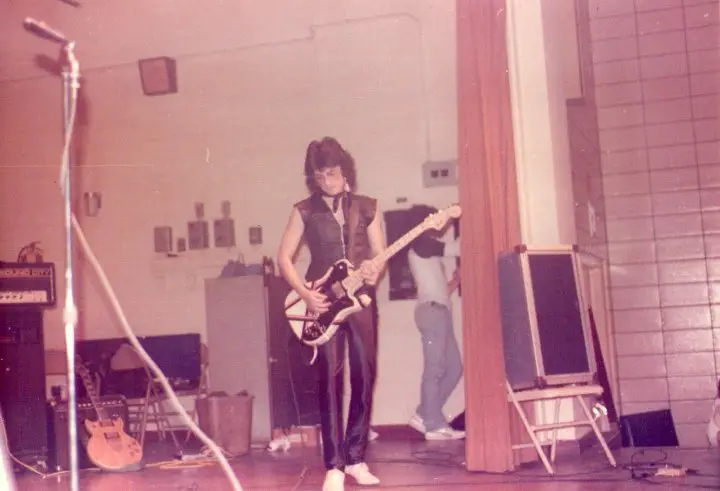
Andrew:
Take me through the formation of Law and Order.
Phil:
Scott Koening, who recently passed away, was the one who brought us together. Sean [Carmody] and I were trying to put together a band, and Rob [Steele] and Shane were doing the same. I did not want to do it at first. Scott and my long-time friend, director Steve Carr, convinced me to do it. At our first show, I think we realized we had something special going on. The audience’s reaction was much more than we deserved — we weren’t that good. We eventually got a house together to live and rehearse in, and that’s when I think we started to blossom. We started to make music that wasn’t modeled directly from any scene or trend. Our influences may have been obvious, but we weren’t trying to sound like anyone else. I think that trend continued to develop. I would have loved to see how that band would have developed over the years.
Andrew:
Law and Order was part of a vibrant late 80s and early 90s hard rock and heavy metal scene along with bands like Spread Eagle. Paint a picture of that scene. What do you recall regarding the band’s first gig?
Phil:
We played clubs like Cat Club, Limelight, Lamours, The Ritz, CBGBs, etc. for a couple of years, and built a large enough following to headline those venues. I remember a fun scene developing and doing shows with other local bands like Raging Slab, White Zombie, Princess Pang, The Throbs, Spread Eagle, Circus of Power, The Lunachicks. More and more people were coming to shows and we would get to open for national acts like LA Guns, Faster Pussycat, Zodiac Mindwarp. I remember opening for Gun ‘N Roses at Limelight right before we were signed — it was the night before their MTV Ritz show — that was a blast.
Andrew:
Law and Order were signed by MCA Records in the late 80s. What did the courtship look like?
Phil:
I’d say Lamours and Cat Club were very supportive and instrumental in us building a strong following. We have a couple of labels that offered us deals and we thought the MCA deal was best. We loved our A&R rep, Bruce Dickinson — he was a great guy and truly believed in us. I remember him coming to three shows, Cat Club, The Pyramid, and then, Lamours with Skid Row.


Andrew:
Take me through the writing, recording, and reception of Law and Order’s debut record, Guilty of Innocence.
Phil:
For Guilty of Innocence, we had four years’ worth of songs from three writers — myself, Shane, and Sean — to chose from. The acoustic material was written at the very end to add more dimension to the record and is some of my favorite. I remember sitting around our living room writing together adding to each other’s songs. Rob played on the radiators in our home for percussion on “Delta Prison Blues,” while I was adding slide guitar. We had a large rehearsal studio upstairs where we worked out arrangements live, but the writing was in our living room.
Our A&R man, Bruce, wanted us to record in Memphis — so we could get out of the city and soak up the blues influence — and we loved the idea. That was a great experience for us living and recording there. I remember when we got to meet and hang with Stevie Ray Vaughan when we were checking out at Kiva Studio when he was recording there. That was a highlight. We wound up recording at Ardent Studios with Joe Hardy. We loved him and we went for a very live feel for the record. I remember at the end of that recording, we invited thirty or so writers from every music publication to come and listen to the record in the studio. The City of Memphis honored us by giving us the keys to the city, which was another big highlight.
Andrew:
My understanding is that Law and Order were supposed to hit the road with Mother Love Bone, but the death of Andrew Wood derailed the tour. Why didn’t MCA get you locked into another tour to promote the debut?
Phil:
We released our first album and had really strong press, and support through MTV. We were scheduled to tour a co-headlining bill with Mother Love Bone across the US. Unfortunately, Andrew Wood died on the eve of that tour. That was a horrible tragedy for them and losing the tour really hurt us. We couldn’t get another tour in time to help the record. And MCA was having a lot of trouble breaking any rock bands at the time, so the combination was disastrous. We did finally get a small tour with Raging Slab, but they were on RCA, who didn’t know how to break them, and they were at the end of their run for their first record, so that tour didn’t help either of our bands.
Andrew:
Like many other east coast bands, major commercial success eluded Law and Order. As the 80s broke way toward the 90s, how big of an effect did the Grunge scene have on Law And Orders fortunes?
Phil:
Grunge should have been a benefit for us since we never really fit in with the scene when we released our first record. We didn’t know grunge would be a thing, but we knew we sounded more like that scene than anything else. That’s why the tour with Mother Love Bone made sense to us, and our label. But that was before grunge – we just fit together as bands. If that tour happened we might have been more associated with the next trend to come.
Andrew:
In retrospect, it seems that MCA Records was incapable of properly promoting bands such as yourself and your fellow bands on the NYC scene. What are your thoughts regarding your label support in the early 90s? Do you feel MCA Records properly supported the band?
Phil:
Bruce was great and the NYC city office really wanted to push the band, but the headquarters in LA couldn’t have cared less about the hard rock and metal bands. I think that was the disconnect. Distribution was not lined up properly, and there were no records in stores when MCA bands toured. It was a half-hearted attempt to promote bands for a short period of time. MCA Records wasn’t committed to breaking anything, so all the bands suffered, and no one broke through.


Andrew:
Law and Order toured with the likes of Blind Melon and Pearl Jam, and the band’s second album, Rites of Passage, seems to reflect some alternative stylings. Would you agree? What was the progression like for the band during the recording of its second record?
Phil:
We were still just writing the way we always did. If it felt more alternative, it was not consciously done that way. It was a natural progression from what we were doing, and some of those songs were older songs as well. The big difference to me was our working with our producer, Reinhold Mack, he was known for producing Queen, and he brought a new dimension to our recording, and our music. We loved working with him and we were able to flesh out the instrumentation, and arraignments the way we wanted to.
Andrew:
While Law and Order are often lumped in with the hair and glam scene, in reality, the band crossed over so many genre boundaries. Do you feel the band was pigeonholed, and if yes, how detrimental to the band’s fortunes was that?
Phil:
It definitely hurt the band. After MCA pulled us off tour with Pearl Jam at the beginning of the Ten release, because they thought Pearl Jam was a hype band, and not going to break — I’m not kidding — we fought to get off the label. That was the final straw for us. We were on the road with Pearl Jam, knew they were breaking huge, and it was a gift to even have that tour. MCA didn’t want to let us go at all, so we went bankrupt intentionally to break all our contracts. By the time the legal dust settled, and we were ready to shop the demos for our third record, the change had happened, and we were lumped in with the old, and not considered financially viable with the new grunge scene, even though we were gravitating around that very early on. The labels who wanted the band were no longer interested. MCA, which is now Universal Music Group, is still hurting the band to this day. They refuse to release the first two records, and they refuse to give the rights of those records back to us, so we can release them. I’m really not sure why.
Andrew:
Take me through the end of Law and Order. Ultimately, what were the circumstances surrounding the band at the time that led to the fracture?
Phil:
We had a lot of bad luck. We seemed to be so close but we were held back by the lack of vision and support from MCA. We just kept hitting a brick wall, so we just decided to end the band. We did a final show at The LimeLight with our friends Spread Eagle and parted ways when the show was over.

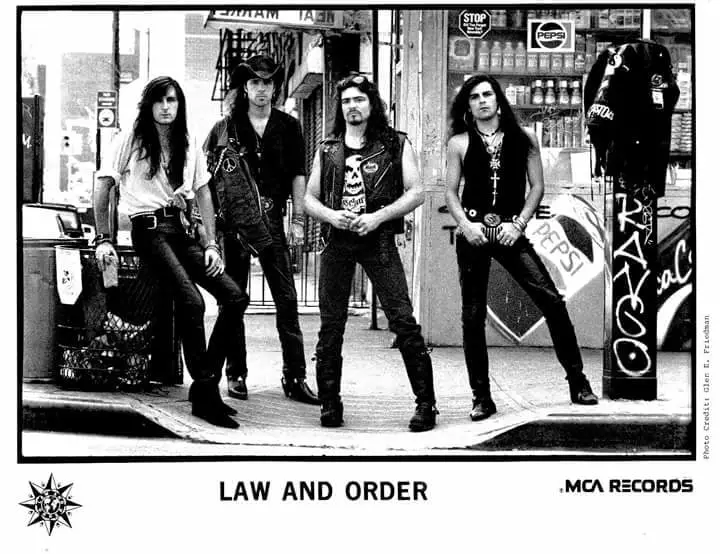
Andrew;
In short order, you and Sean formed Dogma. Walk me through the formation of that band. Do you feel that Dogma allowed you to do some things musically which perhaps Law and Order didn’t?
Phil:
With Law and Order over, we all still wanted to continue, so Sean and I decided to stick together, and Shane and Rob stuck together. I couldn’t imagine trying to find a singer, so I decided to front my own band and recruited new members; Dave Femia was a drummer in Spread Eagle that I knew, and he had chemistry with Sean and me so we started Dogma. Dogma was a continuation of what I was doing in Law and Order, the difference was more in the production, I think it was much heavier because of the music around us but I regret that. I wasn’t happy with the recording experiences with Dogma, the band didn’t agree on the direction, and I think the sound didn’t enhance the songwriting. But I am proud of the songs.
Andrew:
1997’s Feeding The Future is an underrated gem of an album. Feeding The Future was recorded between Bearsville Sound Studios and Riversound Studios. What do you recall regarding the sessions?
Phil:
Thanks for saying that. I am proud of those songs. The sessions were not fun at all for me. We did not take our music to the next level — as we should have — we were in a tug of was with our producer and ourselves. It was chaos in my opinion. We were lucky to come out with a record at all.
Andrew:
You’re on record stating that Dogmas would be second album is the best thing you’ve ever done musically. Do you still feel that way? With the massive amount of talent and incredible songsmith, ultimately, what led to the end of Dogma?
Phil:
Yes, I felt like I found my voice in all aspects of my writing and recording. I felt and still feel very passionate about that music – maybe I’m the only one. [Laughs]. But that record was not released, and we were dropped when our label changed over to a new head of A&R. He dropped a bunch of bands that he wasn’t involved in signing.
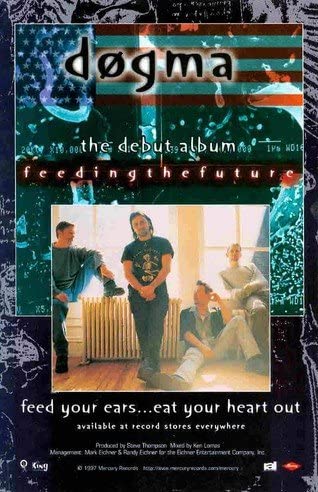
Andrew:
After the end of Dogma, what led you to pivot and move into an entirely new space in web design, writing, directing, and producing?
Phil:
After ten years of heartbreak, and I don’t mean to sound dramatic, but when you seem to get close to a dream being realized over and over again — but it falls apart, fails, or disappoints — it takes its toll. When Dogma got dropped, it felt like ten years of failure. I had nothing to show for all the work, and no money or opportunities to continue. I was complaining to my best friend at the time, saying how bad I thought I had it and he said, “Why don’t you get your head out of your ass and get a job like everybody else?” So, that’s what I did. [Laughs].
Andrew:
What was the sequence of events which led to the release of The Glass House through Z Records?
Phil:
The Glass House is the demos we made right after the second record – we held them from MCA and shopped it after we broke our contract. The Glass House would have been the starting point for the third record, but no label wanted us. With MCA refusing to re-rerelease our records, I thought we could at least get out those demos. I’m not sure how it came about, but Z Records reached out to me, and we sold them the rights to release the demos as a third record. It would have been a good time to reunite, and tour, but we never did. I wasn’t interested in any of that at the time.
Andrew:
The Glass House was another excellent offering by Law and Order. What do you recall regarding its reception?
Phil:
Those demos were all recorded at our house where we all lived together. They were never meant to be heard – they were the working references for the next record but at least, in hindsight, it gives anyone who is interested some insight into how we sounded to ourselves, what the songs sound like without anyone outside of the band influencing us, and what we sounded like before we went into the studio. I think it would have been a great record, but I’m biased, of course.
Andrew:
In regards to your career, you’ve been a member of two incredible bands, Law and Order, and Dogma, and it seems that fate always seemed to knock you down. Looking back, what are your thoughts regarding the hardships those two bands faced?
Phil:
That’s a tough one. It was years before I couldn’t even listen to music or pick up a guitar after Dogma. I feel like my career has been a series of sand paintings that just disappear when they are done.
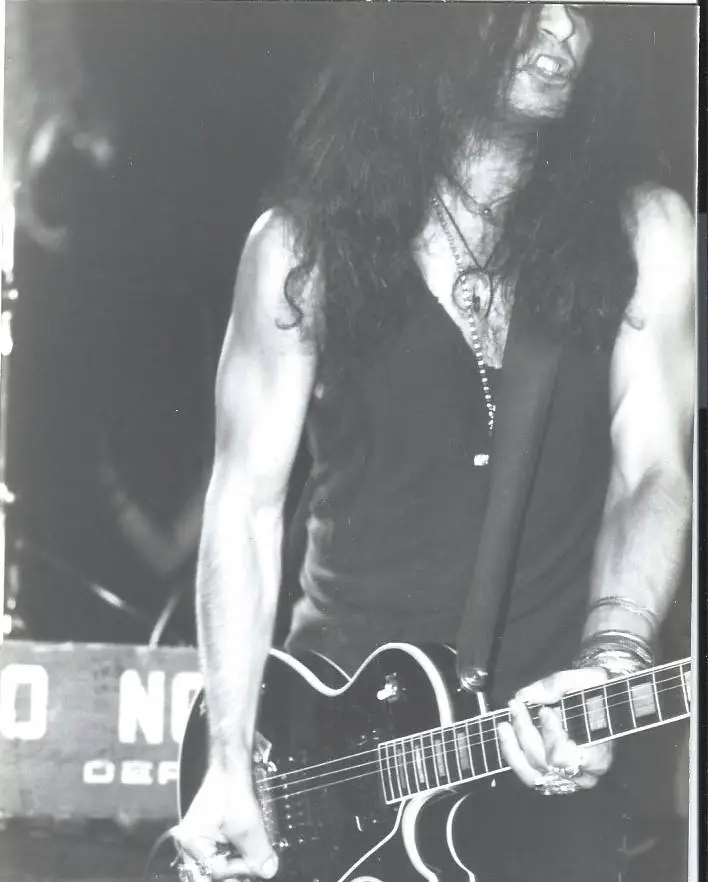
Andrew:
On the flip side, you’ve had nothing but success and acclaim in your second act as a writer, producer, and director. How bittersweet is that for you?
Phil:
Life is bittersweet. [Laughs]. I am blessed to have had all these amazing experiences and have nothing but gratitude for all of it – the ups and the downs. Nothing lasts, no matter how hard we try to hold on. I loved making films, working with actors, and creating on such a big scale. I hope to do it again soon. If the universe, or whatever, presents me with the right open door — I’ll jump right through it, for better or worse. [Laughs].
Andrew:
I’d be remiss if I didn’t mention your old friends in Spread Eagle. You directed the video for “Speed of Sound.” Break down the concept and the shoot for us.
Phil:
I love Rob! He asked me to do it and I was honored, and proud to be involved, and help them realize that vision. Rob [DeLuca] had a very clear idea of what he wanted. It was super fun. They are all good friends and I loved doing it. Another good friend, Randy Slavin, brought his massive drone set up. Randy is an amazingly talented director/artist in his own right. Also, my Director of Photography from The Truth About Lies, Peter Mariuzza, came on board to film it. Great vibe – all friends playing together.
Andrew:
Do you see yourself joining or starting a new band, and giving it one more go? Where do things stand regarding Law and Order today? Many bands of your ilk have reformed and signed to labels such as Frontiers. Is that potentially in the cards for Law and Order? I’d ask the same question regarding Dogma, which put forth some incredible music.
Phil:
I think it’s all about opportunity and timing. If it somehow made sense, maybe there would be a way to make more music. If that happens, I would love it. I still write music, just like I keep writing scripts. Maybe the future will present a situation that allows me to create again, and share it. Maybe not. Who knows?
Andrew:
Last one. These days, you’re a man of many hats. Having said that, what’s next for you in all lanes, Phil?
Phil:
I am trying to get a drama and sci-fi feature off the ground. Hopefully, I can get the funding to make one of them. I am also going to continue to make music and art, I’m just not sure if I’ll do anything with it. I am also working with an amazing creative agency, Red Thread, filming and creating content in the commercial and corporate space, which has been very challenging and satisfying. One thing I learned over the years is that the satisfying experiences in the creative world are all about the people you get to create with. I’ve grown more and more interested in the people I create with than the chase of what my ego wants to create.
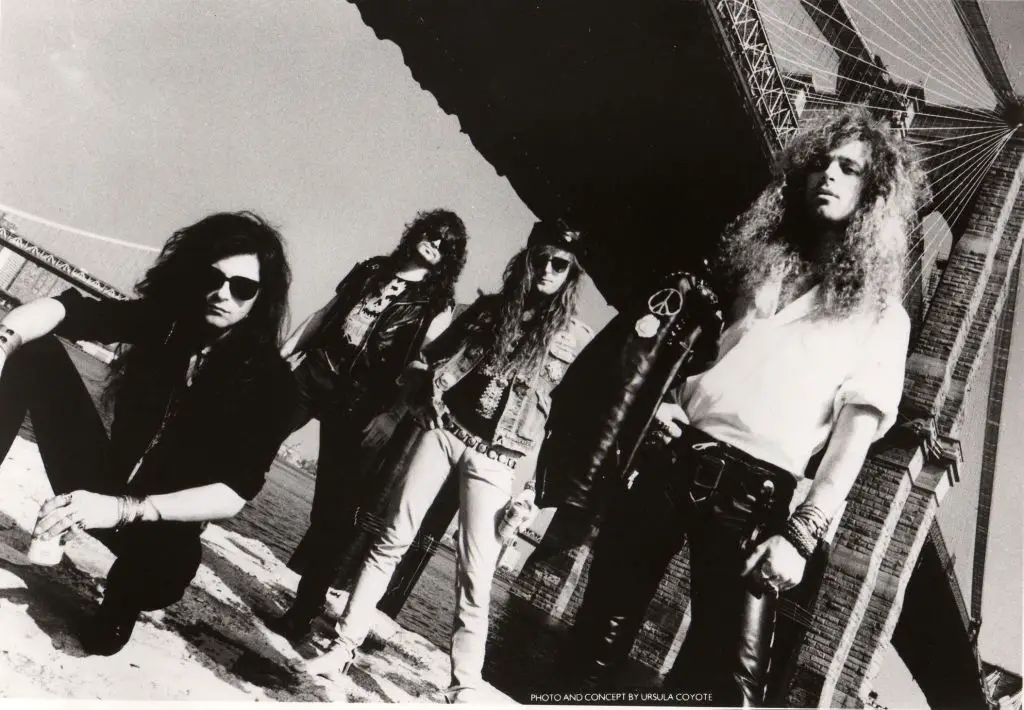
Interested in learning more about Law and Order? Hit the link below:
Be sure to check out the full catalog of VWMusic Interviews, by Andrew Daly, here: www.vinylwritermusic.com/interviews
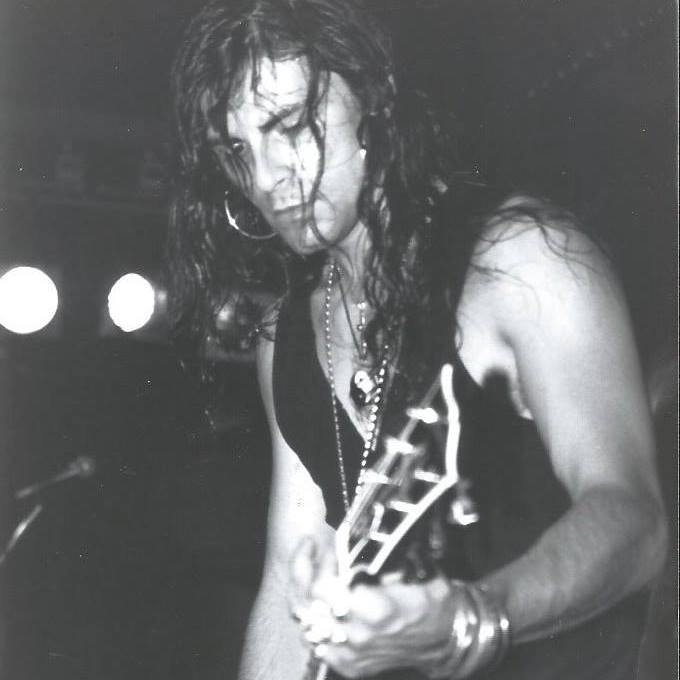




Leave a Reply